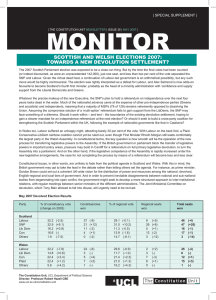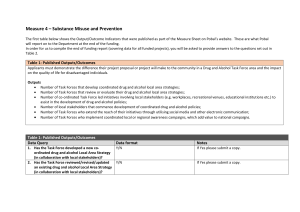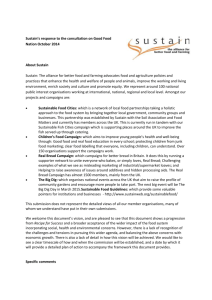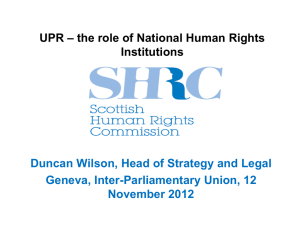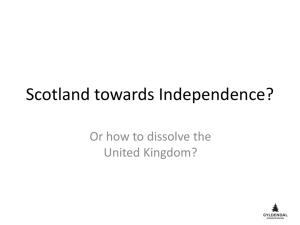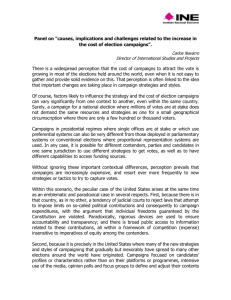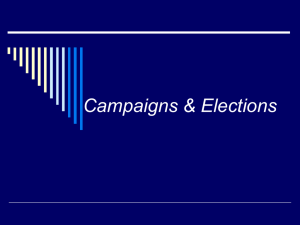Referendum Campaigning and the Future of Scotland
advertisement
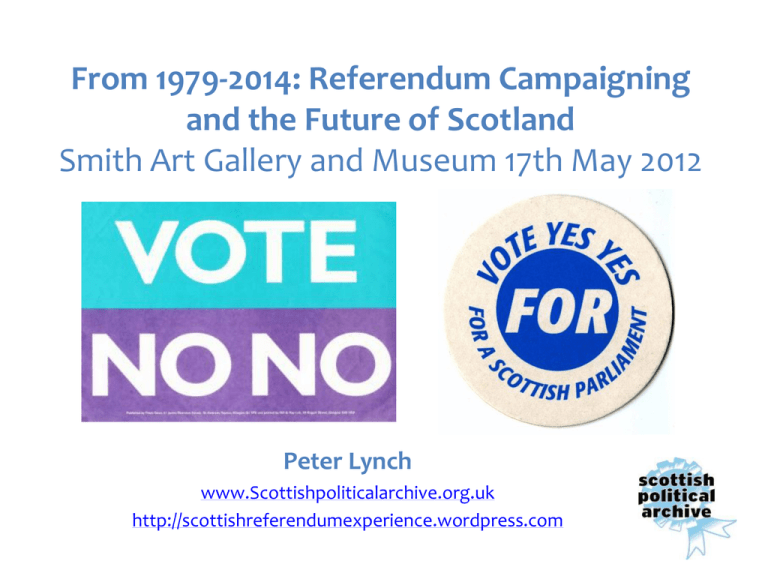
From 1979-2014: Referendum Campaigning and the Future of Scotland Smith Art Gallery and Museum 17th May 2012 Peter Lynch www.Scottishpoliticalarchive.org.uk http://scottishreferendumexperience.wordpress.com Key Themes • referendums unconstitutional - but practice emerges • partisanship and party interests central • referendums - opposition-generated • importance of process, procedure and format • divided campaigns • timing • referendums not always what they should be about British Referendum Experience • 1975 European Community • 2011 Alternative Vote • 1979 Scottish Assembly • 1997 Scottish Parliament 1979 Format and Context • question and rules - 40% rule • no public information campaign • timing - closeness to UK general election • economic crisis • partisan issues 1979 Campaigns • 8 Yes campaigns • No campaigns founded in 1976 Helen Liddell ‘We will not be soiling our hands by joining any umbrella Yes group. We will be fighting for devolution only with the Scottish TUC and the Cooperative Party (A Labour subsidiary).’ (Bochel, Denver and Macartney 1981: 17). Michael Connarty • Collaboration, here? Oh my goodness no. Remember I had set out to take a seat off an SNP councillor in 1977 and win the council off them in 1980. No it was a war zone, it just was, it was not a place where there was a great deal of scope for working together. (Spa/145) 1997 Format and Context • 2 question - separate parliament from tax and refer to ‘tax-varying powers’. • Honeymoon period after UK general election • Tories obliterated at general election in 1997 1997 Campaigns Yes • three Yes parties • cross-party unity • Scotland Forward - from 1996, researched campaign messages and approach No • One No party, isolated and unpopular - Dalyell much less active, Labour MPs disciplined. Strategy for the Campaign ‘If we had an outbreak of arguing, either about independence or about people as individuals. Basically the Scots would stay at home, they would not vote No but they would stay at home and we would not get the decisive result that we needed. So the whole strategy rested on two ideas. One was that there was already – that the Scots had already settled that there had to be a change. And secondly the only thing that would prevent us getting there was an outbreak of argument between the two principal parties and that was the strategy’ Nigel Smith SPA/753/1 (Chairman Scotland FORward) 2014 Referendum Format One question independence • Yes/No Two question devobetter + independence • Yes, Yes • No, Yes • Yes, No • No, No • Unionists want Binary choice to defeat SNP • SNP might like second choice fallback position • Second options - devo-max and Devo Plus, Labour and Lib Dems and others working on independence alternatives. Devo-Max The Scottish Parliament and Government would take on more responsibility for domestic matters and for raising, collecting and administering all (or the vast majority of) revenues in Scotland and the vast bulk of public spending. The UK Government and institutions would continue to have responsibility for matters such as macroeconomic policy and defence, but the Scottish Parliament and Government would have a greater range of measures available to them to support sustainable economic growth (Scottish Government 2010: 12). 2014 Campaigning • Unionist unity? Between Conservatives, Labour and Liberal Democrats problematic due to general election and party interests • SNP, Greens, left and non-party groups - more united. • official versus unofficial campaigns • Yes campaign up and running since October 2011 - with money and activists • will the No campaign really campaign on the ground? • Stephen Maxwell question - who will campaign for a devo-max question? • Where are civic groups, newspapers, business, etc.? 2014 Timing • practical timing - need for consultation, legislation, preparation, etc. • closeness to UK general election - Conservative effect? • economic recession to recovery? • persuasion time? • preparation time for parties? • 1979 and 1997 were quick sprints - 2014 is a marathon.


